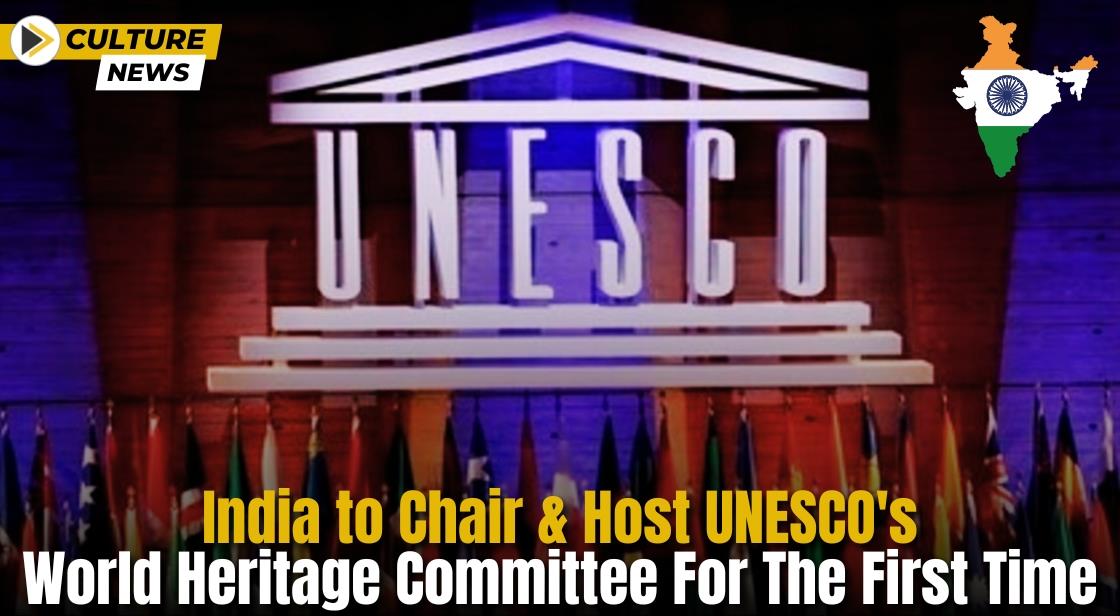India to Chair and Host UNESCO's World Heritage Committee for the first time

News Synopsis
In an unprecedented milestone, India is poised to take the helm and host UNESCO's World Heritage Committee session from July 21 to 31, 2024, as confirmed by Vishal V Sharma, India's Permanent Representative to UNESCO. This historic occasion positions New Delhi as the epicenter for global deliberations on heritage conservation, signifying a momentous chapter in India's rich cultural and historical narrative.
India's Unique Leadership and Hosting Opportunity
This unprecedented opportunity marks the first instance of a country simultaneously leading and hosting the prestigious World Heritage Committee. UNESCO's official statement highlights India's proposal and the subsequent decision, underscoring the significance of New Delhi as the chosen venue for the 46th session.
UNESCO's Mission and World Heritage Committee
UNESCO, a specialized agency of the United Nations, endeavors to foster global peace and security through collaboration in education, arts, science, and culture. The World Heritage Committee, comprising representatives from 21 member states and convening annually, holds a pivotal role in enriching the distinguished list of UNESCO World Heritage Siates.
India's Cultural Legacy at the Forefront
India's leadership in this global forum amplifies the country's commitment to heritage preservation and cultural conservation on a worldwide platform. The forthcoming session in New Delhi is poised to showcase India's dedication to safeguarding its rich legacy for future generations.
Beyond the event: A platform for shared knowledge and collaboration
The 11-day event extends beyond mere hosting. It paves the way for:
-
Knowledge exchange: India's diverse and rich cultural tapestry, encompassing ancient wonders like the Taj Mahal and vibrant artistic traditions, will be showcased to representatives from across the globe. This fosters cross-cultural understanding and a spirit of collaboration in protecting heritage sites worldwide.
-
Focus on regional heritage: With India at the helm, the session is expected to highlight the importance of preserving cultural and natural treasures in Asia and beyond. This regional focus can lead to targeted initiatives and support for safeguarding endangered heritage sites in the continent.
-
Strengthening India's position as a cultural leader: By spearheading this prestigious event, India solidifies its role as a champion of cultural preservation not only within its borders but also as a responsible member of the international community.
Unpacking the UNESCO World Heritage Committee: Guardians of Global Treasures
The UNESCO World Heritage Committee, established in 1976, stands as the gatekeeper of some of humanity's most precious cultural and natural landmarks. Comprised of representatives from 21 member states elected by the UNESCO General Assembly, this esteemed body holds the critical responsibility of identifying, protecting, and preserving exceptional sites of universal value.
1. Unveiling Jewels of Humanity:
Imagine a mosaic of the world's most breathtaking natural wonders and awe-inspiring cultural creations. From the Great Barrier Reef's kaleidoscopic coral gardens to the towering pyramids of Giza, the World Heritage List showcases humanity's diverse achievements and the irreplaceable beauty of our planet.
This prestigious designation doesn't just bestow recognition; it triggers robust conservation efforts, mobilizes international resources, and fosters cultural exchange that transcends borders.
2. India's Cultural Tapestry: From the Taj to Untold Treasures:
Beyond the iconic Taj Mahal, India boasts a tapestry of heritage sites pulsating with history and cultural significance. From the ancient Buddhist stupas of Sanchi to the intricate Chola temple complexes, each whispers tales of empires, artistic brilliance, and evolving faith.
The upcoming hosting of the World Heritage Committee in New Delhi offers a unique opportunity to spotlight India's diverse heritage, extending far beyond the Taj Mahal's marble embrace.
3. Joining Hands for Endangered Gems:
With globalization and climate change posing unprecedented threats to heritage sites, international collaboration is more crucial than ever. The World Heritage Committee fosters crucial partnerships between nations, providing technical expertise, financial assistance, and coordinated conservation efforts.
Recent examples include collaborative initiatives to safeguard the war-torn cultural treasures of Syria and address the rising sea levels endangering Venice's historic lagoon.
India's Leadership: Charting a Path of Sustainable Stewardship:
As the first Asian nation to chair the World Heritage Committee, India shoulders a historic responsibility. Its leadership can shape the discourse around heritage preservation, placing emphasis on inclusivity, community engagement, and sustainable management practices.
Imagine a future where indigenous communities actively participate in safeguarding ancestral sites, where sustainable tourism supports conservation efforts, and where cutting-edge technology guards against environmental threats.
This is the vision India can champion during its historic hosting, paving the way for a brighter future for heritage conservation on a global scale.
You May Like









